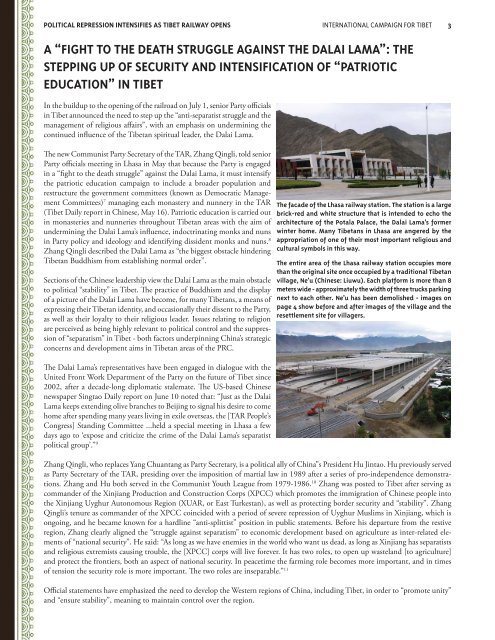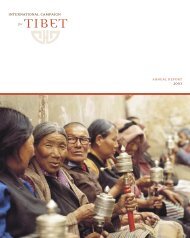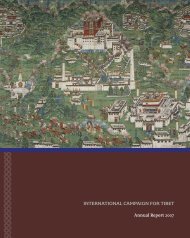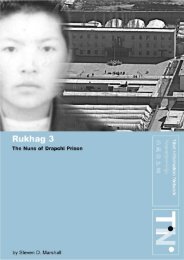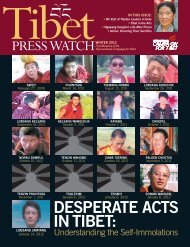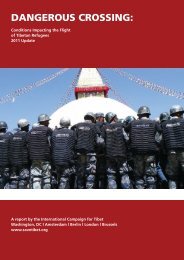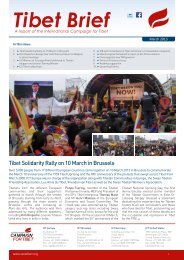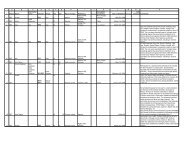Political Repression Intensifies as Tibet Railway Opens
Political Repression Intensifies as Tibet Railway Opens
Political Repression Intensifies as Tibet Railway Opens
- No tags were found...
Create successful ePaper yourself
Turn your PDF publications into a flip-book with our unique Google optimized e-Paper software.
POLITICAL REPRESSION INTENSIFIES AS TIBET RAILWAY OPENS INTERNATIONAL CAMPAIGN FOR TIBET 3A “FIGHT TO THE DEATH STRUGGLE AGAINST THE DALAI LAMA”: THESTEPPING UP OF SECURITY AND INTENSIFICATION OF “PATRIOTICEDUCATION” IN TIBETIn the buildup to the opening of the railroad on July 1, senior Party officialsin <strong>Tibet</strong> announced the need to step up the “anti-separatist struggle and themanagement of religious affairs”, with an emph<strong>as</strong>is on undermining thecontinued influence of the <strong>Tibet</strong>an spiritual leader, the Dalai Lama.The new Communist Party Secretary of the TAR, Zhang Qingli, told seniorParty officials meeting in Lh<strong>as</strong>a in May that because the Party is engagedin a “fight to the death struggle” against the Dalai Lama, it must intensifythe patriotic education campaign to include a broader population andrestructure the government committees (known <strong>as</strong> Democratic ManagementCommittees) 7 managing each mon<strong>as</strong>tery and nunnery in the TAR(<strong>Tibet</strong> Daily report in Chinese, May 16). Patriotic education is carried outin mon<strong>as</strong>teries and nunneries throughout <strong>Tibet</strong>an are<strong>as</strong> with the aim ofundermining the Dalai Lama’s influence, indoctrinating monks and nunsin Party policy and ideology and identifying dissident monks and nuns. 8Zhang Qingli described the Dalai Lama <strong>as</strong> “the biggest obstacle hindering<strong>Tibet</strong>an Buddhism from establishing normal order”.Sections of the Chinese leadership view the Dalai Lama <strong>as</strong> the main obstacleto political “stability” in <strong>Tibet</strong>. The practice of Buddhism and the displayof a picture of the Dalai Lama have become, for many <strong>Tibet</strong>ans, a means ofexpressing their <strong>Tibet</strong>an identity, and occ<strong>as</strong>ionally their dissent to the Party,<strong>as</strong> well <strong>as</strong> their loyalty to their religious leader. Issues relating to religionare perceived <strong>as</strong> being highly relevant to political control and the suppressionof “separatism” in <strong>Tibet</strong> - both factors underpinning China’s strategicconcerns and development aims in <strong>Tibet</strong>an are<strong>as</strong> of the PRC.The Dalai Lama’s representatives have been engaged in dialogue with theUnited Front Work Department of the Party on the future of <strong>Tibet</strong> since2002, after a decade-long diplomatic stalemate. The US-b<strong>as</strong>ed Chinesenewspaper Singtao Daily report on June 10 noted that: “Just <strong>as</strong> the DalaiLama keeps extending olive branches to Beijing to signal his desire to comehome after spending many years living in exile overse<strong>as</strong>, the [TAR People’sCongress] Standing Committee ...held a special meeting in Lh<strong>as</strong>a a fewdays ago to ‘expose and criticize the crime of the Dalai Lama’s separatistpolitical group’.” 9The facade of the Lh<strong>as</strong>a railway station. The station is a largebrick-red and white structure that is intended to echo thearchitecture of the Potala Palace, the Dalai Lama’s formerwinter home. Many <strong>Tibet</strong>ans in Lh<strong>as</strong>a are angered by theappropriation of one of their most important religious andcultural symbols in this way.The entire area of the Lh<strong>as</strong>a railway station occupies morethan the original site once occupied by a traditional <strong>Tibet</strong>anvillage, Ne’u (Chinese: Liuwu). Each platform is more than 8meters wide - approximately the width of three trucks parkingnext to each other. Ne’u h<strong>as</strong> been demolished - images onpage 4 show before and after images of the village and theresettlement site for villagers.Zhang Qingli, who replaces Yang Chuantang <strong>as</strong> Party Secretary, is a political ally of China”s President Hu Jintao. Hu previously served<strong>as</strong> Party Secretary of the TAR, presiding over the imposition of martial law in 1989 after a series of pro-independence demonstrations.Zhang and Hu both served in the Communist Youth League from 1979-1986. 10 Zhang w<strong>as</strong> posted to <strong>Tibet</strong> after serving <strong>as</strong>commander of the Xinjiang Production and Construction Corps (XPCC) which promotes the immigration of Chinese people intothe Xinjiang Uyghur Autonomous Region (XUAR, or E<strong>as</strong>t Turkestan), <strong>as</strong> well <strong>as</strong> protecting border security and “stability”. ZhangQingli’s tenure <strong>as</strong> commander of the XPCC coincided with a period of severe repression of Uyghur Muslims in Xinjiang, which isongoing, and he became known for a hardline “anti-splittist” position in public statements. Before his departure from the restiveregion, Zhang clearly aligned the “struggle against separatism” to economic development b<strong>as</strong>ed on agriculture <strong>as</strong> inter-related elementsof “national security”. He said: “As long <strong>as</strong> we have enemies in the world who want us dead, <strong>as</strong> long <strong>as</strong> Xinjiang h<strong>as</strong> separatistsand religious extremists causing trouble, the [XPCC] corps will live forever. It h<strong>as</strong> two roles, to open up w<strong>as</strong>teland [to agriculture]and protect the frontiers, both an <strong>as</strong>pect of national security. In peacetime the farming role becomes more important, and in timesof tension the security role is more important. The two roles are inseparable.” 11Official statements have emph<strong>as</strong>ized the need to develop the Western regions of China, including <strong>Tibet</strong>, in order to “promote unity”and “ensure stability”, meaning to maintain control over the region.


